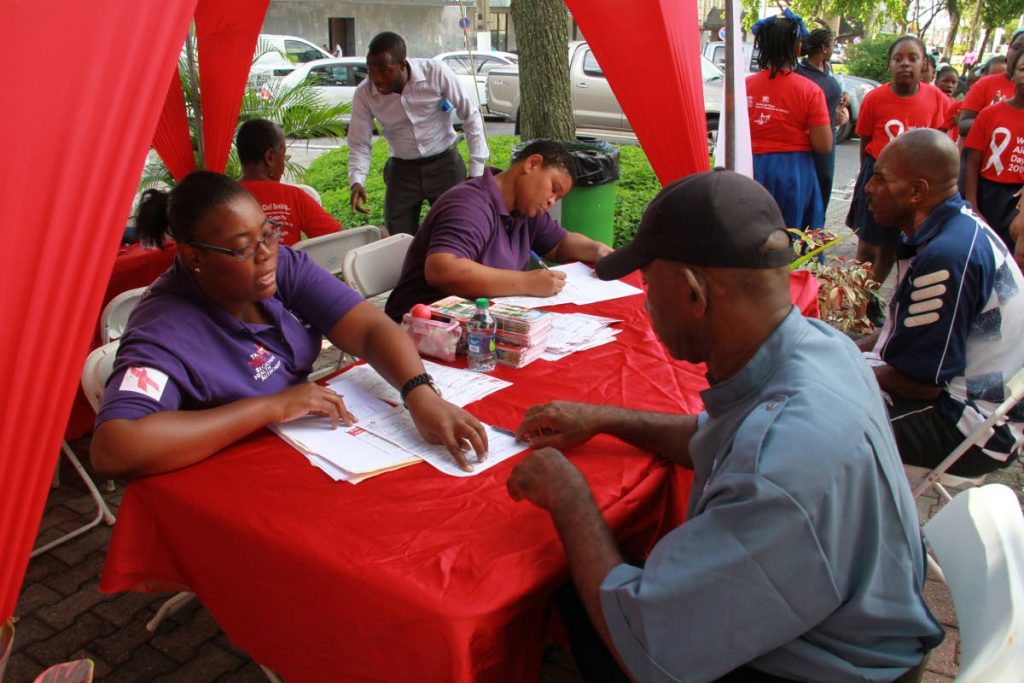Caribbean lagging behind world in HIV/AIDS targets

Stigma and discrimination remain some of the key factors in discouraging people from seeking testing and treatment for HIV/AIDS and the covid19 pandemic has exacerbated these problems. The introduction of self-testing will hopefully address some of these concerns in the Caribbean.
These were some of the conclusions which came out of the World AIDS Day 2020 Caribbean virtual panel discussion and launch of the In Your Hands HIV self-testing advocacy campaign on Tuesday.
The event was hosted by UNAIDS, the Pan-American Health Organisation, the Pan-Caribbean Partnership against HIV/AIDS (Pancap) and the President's Emergency Plan For AIDS Relief (PEPFAR)
UNAIDS Caribbean sub-regional office director Dr James Guwani said while the world will miss the 90-90-90 targets set by UNAIDS for 2020, the Caribbean is lagging even further behind in reaching the targets.
The targets refer to 90 per cent of all people living with HIV knowing their HIV status, 90 per cent of all people with diagnosed HIV infection receiving sustained antiretroviral therapy, and 90 per cent of all people receiving antiretroviral therapy having viral suppression.
He said in 2019, there were 370,000 people living with HIV/AIDS in the Caribbean. He said while the world is at 81, 82 and 88 per cent for the three targets, the Caribbean is at 77, 81 and 80 per cent, and would not reach the targets by the end of 2020.
Guwani said while significant progress has been made toward reducing AIDS-related death, treatment coverage for men is significantly lower than for women and reduction of new infections is also slower for men. He said new infections are highest among adult men, while young people account for a third of new infections. He said both key populations – such as gay men and other men who have sex with men, sex workers and their clients, people who inject drugs, and transgender people –and the remaining population were at risk.
Activists from around the Caribbean said while treatment is available for those who have been diagnosed, accessing treatment had become even harder since covid19 restrictions began.
A member of the Community of Positive Women in the Caribbean, Deneen Moore, said a lack of privacy at clinics, where patients now had to announce what treatment they were accessing, a lack of financial security due to job loss, including housing, food and public transportation, and a slowing down of non-covid19 services in the healthcare sector were all factors which led to people not accessing treatment. She said when people are diagnosed with HIV, they are not given adequate counselling or time to process, which may also lead to their not seeking treatment.
National Family Planning Board of Jamaica’s Enabling Environment and Human Rights Unit director Devon Gabourel said another problem was that clinics were handing out medication monthly, rather than on a multiple-month basis, owing to difficulties with supply chains. He said this increased the risk of people catching covid19, especially those with compromised immune systems.
Yaisah Val, Haiti’s first openly transgender woman, who recently opened a shelter for transgender people in the country, said transgender people are ostracised and shunned if they try to enter a clinic, even being seen as bad omens and the cause of the disease. She said they are not allowed on public transport and are even shunned by healthcare workers.
The activists said self-testing would help increasethe number of people who were diagnosed, as many people were reluctant to go to a clinic to be tested. They said issues to be considered would be cost, proper labelling and instructions for users, and education of health professionals about the tests.
Caribbean Medical Labs Foundation (CMLF) director Valerie Wilson said the organisation will be carrying out a HIV self-testing project throughout the Caribbean, beginning in December, to see if the saliva or blood tests, which have been approved by the World Health Organisation and are all 95 per cent accurate or above, will work in a Caribbean context. Part of the project will be developing proper packaging and instructions. She said the project has to wait on country approval.
PAHO technical adviser Sandra Jones said if someone teste positive at home, they would need to be linked to the health system to receive counselling and hopefully treatment. She said the tests can be accessed through PAHO’s strategic fund, making them accessible at cheaper than market rates.

Comments
"Caribbean lagging behind world in HIV/AIDS targets"